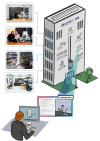Differences
This shows you the differences between two versions of the page.
| Both sides previous revisionPrevious revisionNext revision | Previous revisionNext revisionBoth sides next revision | ||
| teaching:gsoc2018 [2018/01/23 08:52] – [Topic 5: Unreal - openEASE Live Connection] ahaidu | teaching:gsoc2018 [2018/02/19 09:22] – [Topic 2: Flexible perception pipeline manipulation for RoboSherlock] balintbe | ||
|---|---|---|---|
| Line 95: | Line 95: | ||
| **Requirements: | **Requirements: | ||
| language (CPython/ | language (CPython/ | ||
| - | (ideally SRL technques and logic) | + | (ideally SRL technques and logic). Knowledge about C/C++ will be very helpful. |
| **Expected Results:** The core components of pracmln, i.e. the learning | **Expected Results:** The core components of pracmln, i.e. the learning | ||
| Line 104: | Line 104: | ||
| **Contact: | **Contact: | ||
| + | **Remarks: | ||
| + | ==== Topic 2: Flexible perception pipeline manipulation for RoboSherlock ==== | ||
| - | ==== Topic 2: Felxible perception pipeline manipulation for RoboSherlock ==== | + | {{ : |
| - | + | ||
| - | {{ : | + | |
| **Main Objective: | **Main Objective: | ||
| Line 117: | Line 117: | ||
| **Expected Results:** an extension to RoboShelrock that allows splitting and joingin pipelines, executing them in parallel, merging results from multiple types of cameras etc. | **Expected Results:** an extension to RoboShelrock that allows splitting and joingin pipelines, executing them in parallel, merging results from multiple types of cameras etc. | ||
| - | Contact: [[team/ | + | ---- |
| + | |||
| + | e-mail: [[team/ | ||
| + | |||
| + | chat: | ||
| ==== Topic 3: Unreal - ROS 2 Integration ==== | ==== Topic 3: Unreal - ROS 2 Integration ==== | ||
| Line 182: | Line 186: | ||
| Contact: [[team/ | Contact: [[team/ | ||
| + | |||
| + | ==== Topic 7: Robot simulation in Unreal Engine with PhysX ==== | ||
| + | |||
| + | {{ : | ||
| + | |||
| + | **Main Objective: | ||
| + | |||
| + | **Task Difficulty: | ||
| + | level, as it requires programming skills of various frameworks (Unreal Engine, | ||
| + | PhysX), expertise in robotic simulation and physics engines. | ||
| + | | ||
| + | **Requirements: | ||
| + | of the Unreal Engine and PhysX API. Experience in robotics and robotic simulation is a plus. | ||
| + | |||
| + | **Expected Results** We expect to be able to simulate robots in unreal, have support and able to control standard joints. | ||
| + | |||
| + | Contact: [[team/ | ||
Prof. Dr. hc. Michael Beetz PhD
Head of Institute
Contact via
Andrea Cowley
assistant to Prof. Beetz
ai-office@cs.uni-bremen.de
Discover our VRB for innovative and interactive research

Memberships and associations:











